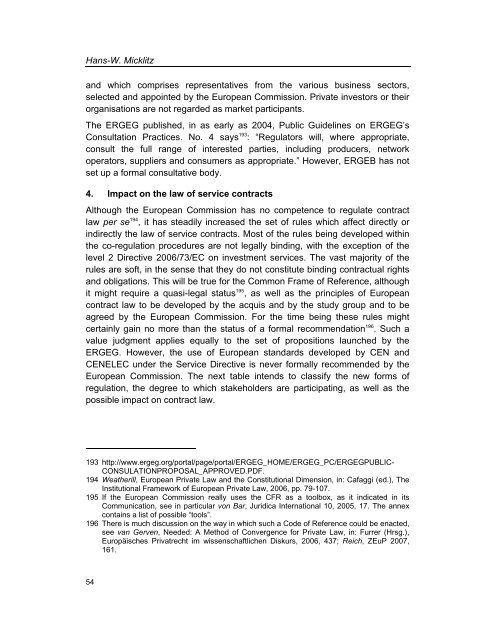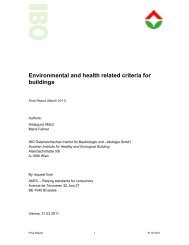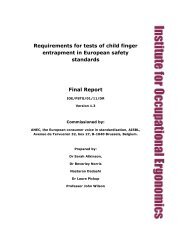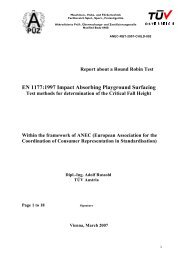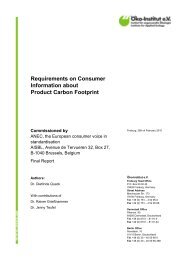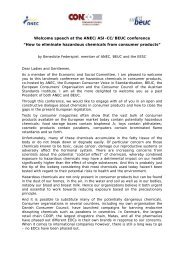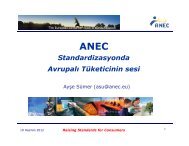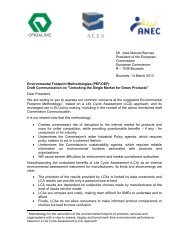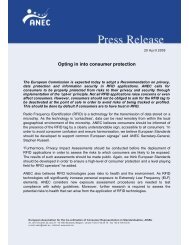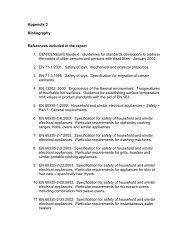Services Standards: Defining the Core Consumer Elements ... - ANEC
Services Standards: Defining the Core Consumer Elements ... - ANEC
Services Standards: Defining the Core Consumer Elements ... - ANEC
Create successful ePaper yourself
Turn your PDF publications into a flip-book with our unique Google optimized e-Paper software.
Hans-W. Micklitz<br />
and which comprises representatives from <strong>the</strong> various business sectors,<br />
selected and appointed by <strong>the</strong> European Commission. Private investors or <strong>the</strong>ir<br />
organisations are not regarded as market participants.<br />
The ERGEG published, in as early as 2004, Public Guidelines on ERGEG’s<br />
Consultation Practices. No. 4 says 193 : “Regulators will, where appropriate,<br />
consult <strong>the</strong> full range of interested parties, including producers, network<br />
operators, suppliers and consumers as appropriate.” However, ERGEB has not<br />
set up a formal consultative body.<br />
4. Impact on <strong>the</strong> law of service contracts<br />
Although <strong>the</strong> European Commission has no competence to regulate contract<br />
law per se 194 , it has steadily increased <strong>the</strong> set of rules which affect directly or<br />
indirectly <strong>the</strong> law of service contracts. Most of <strong>the</strong> rules being developed within<br />
<strong>the</strong> co-regulation procedures are not legally binding, with <strong>the</strong> exception of <strong>the</strong><br />
level 2 Directive 2006/73/EC on investment services. The vast majority of <strong>the</strong><br />
rules are soft, in <strong>the</strong> sense that <strong>the</strong>y do not constitute binding contractual rights<br />
and obligations. This will be true for <strong>the</strong> Common Frame of Reference, although<br />
it might require a quasi-legal status 195 , as well as <strong>the</strong> principles of European<br />
contract law to be developed by <strong>the</strong> acquis and by <strong>the</strong> study group and to be<br />
agreed by <strong>the</strong> European Commission. For <strong>the</strong> time being <strong>the</strong>se rules might<br />
certainly gain no more than <strong>the</strong> status of a formal recommendation 196 . Such a<br />
value judgment applies equally to <strong>the</strong> set of propositions launched by <strong>the</strong><br />
ERGEG. However, <strong>the</strong> use of European standards developed by CEN and<br />
CENELEC under <strong>the</strong> Service Directive is never formally recommended by <strong>the</strong><br />
European Commission. The next table intends to classify <strong>the</strong> new forms of<br />
regulation, <strong>the</strong> degree to which stakeholders are participating, as well as <strong>the</strong><br />
possible impact on contract law.<br />
193 http://www.ergeg.org/portal/page/portal/ERGEG_HOME/ERGEG_PC/ERGEGPUBLIC-<br />
CONSULATIONPROPOSAL_APPROVED.PDF.<br />
194 Wea<strong>the</strong>rill, European Private Law and <strong>the</strong> Constitutional Dimension, in: Cafaggi (ed.), The<br />
Institutional Framework of European Private Law, 2006, pp. 79-107.<br />
195 If <strong>the</strong> European Commission really uses <strong>the</strong> CFR as a toolbox, as it indicated in its<br />
Communication, see in particular von Bar, Juridica International 10, 2005, 17. The annex<br />
contains a list of possible “tools”.<br />
196 There is much discussion on <strong>the</strong> way in which such a Code of Reference could be enacted,<br />
see van Gerven, Needed: A Method of Convergence for Private Law, in: Furrer (Hrsg.),<br />
Europäisches Privatrecht im wissenschaftlichen Diskurs, 2006, 437; Reich, ZEuP 2007,<br />
161.<br />
54


